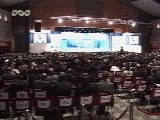NHK reporting from Hong Kong

Farmers around the world are watching what's going on in Hong Kong. The World Trade Organization has begun its biennial ministerial talks there. The members have been trying to create a common set of global trade rules for more than four years, so far without success.
The United States and its allies are pushing trade liberalization including agriculture, while the other camp including Japan, remains firm about protecting domestic farms.
NHK World's Shuhei Ikehata tells us more about the six-day ministerial talks.
Delegates from 149 countries and regions are taking part in the talks. It's a crucial gathering.
They're trying to achieve substantial progress towards a final agreement on trade liberalization before their self imposed deadline of December next year.
Creating the new framework has stalled, mainly over agriculture. There are conflicting interests among the members.
Japan, which imposes nearly 800 percent tariff on rice in order to maintain a stable supply from Japanese farmers, says it cannot accept large-scale liberalization.
The European Union is demanding that eight percent of the all imports subject to tariffs be excluded in the trade liberalization deal.
Before the talks started, Japan's agriculture minister Shoichi Nakagawa and ministers of eight other members, including South Korea and Switzerland, had a meeting.
As food importers, they are against setting tariff caps.
Food exporters like the United States and Brazil favor wide open farm trade.
Before the talks, a US delegate said imposing tariff caps on farm products is essential if any progress is to be made.
US Agriculture Secretary Mike Johanns also criticized the EU's demand, saying if many exemptions are allowed, market liberalization will take a step backwards.
No agreement was reached in the previous talks two years ago.
If this round failures, the existence of the WTO itself might be questioned. Attention is on how big the concessions will be to make a deal.
Shuhei Ikehata, NHK World, Hong Kong.

Comments